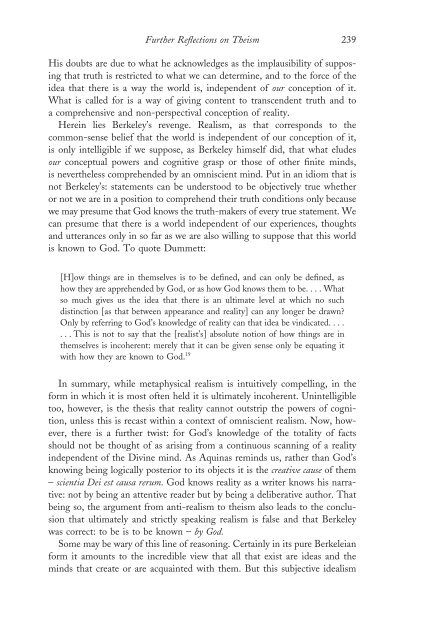Atheism and Theism JJ Haldane - Common Sense Atheism
Atheism and Theism JJ Haldane - Common Sense Atheism
Atheism and Theism JJ Haldane - Common Sense Atheism
Create successful ePaper yourself
Turn your PDF publications into a flip-book with our unique Google optimized e-Paper software.
Further Reflections on <strong>Theism</strong> 239<br />
His doubts are due to what he acknowledges as the implausibility of supposing<br />
that truth is restricted to what we can determine, <strong>and</strong> to the force of the<br />
idea that there is a way the world is, independent of our conception of it.<br />
What is called for is a way of giving content to transcendent truth <strong>and</strong> to<br />
a comprehensive <strong>and</strong> non-perspectival conception of reality.<br />
Herein lies Berkeley’s revenge. Realism, as that corresponds to the<br />
common-sense belief that the world is independent of our conception of it,<br />
is only intelligible if we suppose, as Berkeley himself did, that what eludes<br />
our conceptual powers <strong>and</strong> cognitive grasp or those of other finite minds,<br />
is nevertheless comprehended by an omniscient mind. Put in an idiom that is<br />
not Berkeley’s: statements can be understood to be objectively true whether<br />
or not we are in a position to comprehend their truth conditions only because<br />
we may presume that God knows the truth-makers of every true statement. We<br />
can presume that there is a world independent of our experiences, thoughts<br />
<strong>and</strong> utterances only in so far as we are also willing to suppose that this world<br />
is known to God. To quote Dummett:<br />
[H]ow things are in themselves is to be defined, <strong>and</strong> can only be defined, as<br />
how they are apprehended by God, or as how God knows them to be. . . . What<br />
so much gives us the idea that there is an ultimate level at which no such<br />
distinction [as that between appearance <strong>and</strong> reality] can any longer be drawn?<br />
Only by referring to God’s knowledge of reality can that idea be vindicated. . . .<br />
. . . This is not to say that the [realist’s] absolute notion of how things are in<br />
themselves is incoherent: merely that it can be given sense only be equating it<br />
with how they are known to God. 19<br />
In summary, while metaphysical realism is intuitively compelling, in the<br />
form in which it is most often held it is ultimately incoherent. Unintelligible<br />
too, however, is the thesis that reality cannot outstrip the powers of cognition,<br />
unless this is recast within a context of omniscient realism. Now, however,<br />
there is a further twist: for God’s knowledge of the totality of facts<br />
should not be thought of as arising from a continuous scanning of a reality<br />
independent of the Divine mind. As Aquinas reminds us, rather than God’s<br />
knowing being logically posterior to its objects it is the creative cause of them<br />
– scientia Dei est causa rerum. God knows reality as a writer knows his narrative:<br />
not by being an attentive reader but by being a deliberative author. That<br />
being so, the argument from anti-realism to theism also leads to the conclusion<br />
that ultimately <strong>and</strong> strictly speaking realism is false <strong>and</strong> that Berkeley<br />
was correct: to be is to be known – by God.<br />
Some may be wary of this line of reasoning. Certainly in its pure Berkeleian<br />
form it amounts to the incredible view that all that exist are ideas <strong>and</strong> the<br />
minds that create or are acquainted with them. But this subjective idealism

















